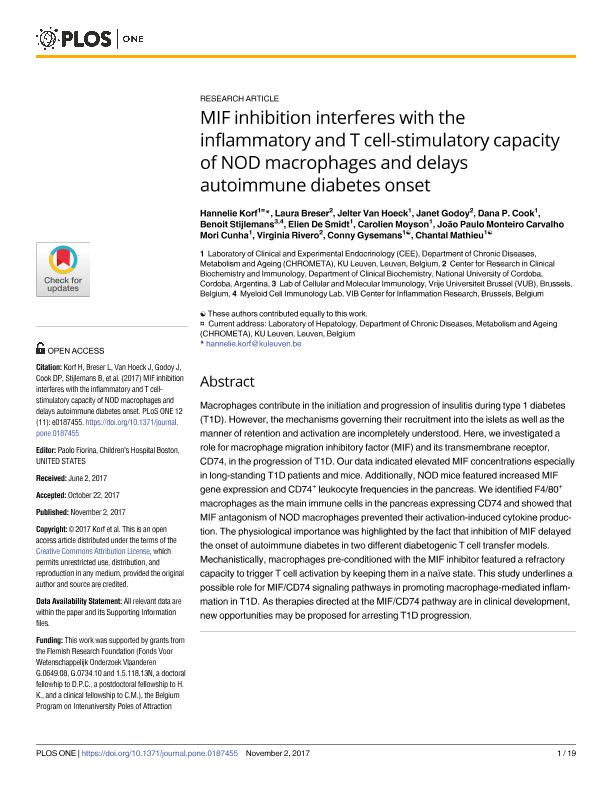Artículo
MIF inhibition interferes with the inflammatory and T cell-stimulatory capacity of NOD macrophages and delays autoimmune diabetes onset
Korf, Hannelie; Breser, Maria Laura ; Van Hoeck, Jelter; Godoy, Gloria Janet
; Van Hoeck, Jelter; Godoy, Gloria Janet ; Cook, Dana P.; Stijlemans, Benoit; De Smidt, Elien; Moyson, Carolien; Cunha, João Paulo Monteiro Carvalho Mori; Rivero, Virginia Elena
; Cook, Dana P.; Stijlemans, Benoit; De Smidt, Elien; Moyson, Carolien; Cunha, João Paulo Monteiro Carvalho Mori; Rivero, Virginia Elena ; Gysemans, Conny; Mathieu, Chantal
; Gysemans, Conny; Mathieu, Chantal
 ; Van Hoeck, Jelter; Godoy, Gloria Janet
; Van Hoeck, Jelter; Godoy, Gloria Janet ; Cook, Dana P.; Stijlemans, Benoit; De Smidt, Elien; Moyson, Carolien; Cunha, João Paulo Monteiro Carvalho Mori; Rivero, Virginia Elena
; Cook, Dana P.; Stijlemans, Benoit; De Smidt, Elien; Moyson, Carolien; Cunha, João Paulo Monteiro Carvalho Mori; Rivero, Virginia Elena ; Gysemans, Conny; Mathieu, Chantal
; Gysemans, Conny; Mathieu, Chantal
Fecha de publicación:
02/11/2017
Editorial:
Public Library of Science
Revista:
Plos One
ISSN:
1932-6203
Idioma:
Inglés
Tipo de recurso:
Artículo publicado
Clasificación temática:
Resumen
Macrophages contribute in the initiation and progression of insulitis during type 1 diabetes (T1D). However, the mechanisms governing their recruitment into the islets as well as the manner of retention and activation are incompletely understood. Here, we investigated a role for macrophage migration inhibitory factor (MIF) and its transmembrane receptor, CD74, in the progression of T1D. Our data indicated elevated MIF concentrations especially in long-standing T1D patients and mice. Additionally, NOD mice featured increased MIF gene expression and CD74+ leukocyte frequencies in the pancreas. We identified F4/80+ macrophages as the main immune cells in the pancreas expressing CD74 and showed that MIF antagonism of NOD macrophages prevented their activation-induced cytokine production. The physiological importance was highlighted by the fact that inhibition of MIF delayed the onset of autoimmune diabetes in two different diabetogenic T cell transfer models. Mechanistically, macrophages pre-conditioned with the MIF inhibitor featured a refractory capacity to trigger T cell activation by keeping them in a naïve state. This study underlines a possible role for MIF/CD74 signaling pathways in promoting macrophage-mediated inflammation in T1D. As therapies directed at the MIF/CD74 pathway are in clinical development, new opportunities may be proposed for arresting T1D progression.
Palabras clave:
Diabetes
,
Mif
Archivos asociados
Licencia
Identificadores
Colecciones
Articulos(CIBICI)
Articulos de CENTRO DE INV.EN BIOQUI.CLINICA E INMUNOLOGIA
Articulos de CENTRO DE INV.EN BIOQUI.CLINICA E INMUNOLOGIA
Citación
Korf, Hannelie; Breser, Maria Laura; Van Hoeck, Jelter; Godoy, Gloria Janet; Cook, Dana P.; et al.; MIF inhibition interferes with the inflammatory and T cell-stimulatory capacity of NOD macrophages and delays autoimmune diabetes onset; Public Library of Science; Plos One; 12; 11; 2-11-2017; e0187455-e0187455
Compartir
Altmétricas



